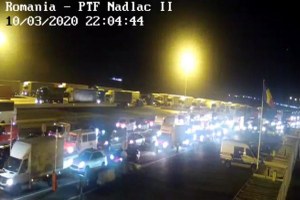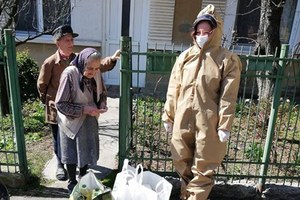The impact of coronavirus in Romania from the perspective of the 2030 Agenda
COVID 19 global outbreak had an unprecedented impact on people and economies around the world, taking into account the last century. While in a context of pandemic, policy makers and citizens are focusing on public health concerns mainly, the sustainable development agenda remains highly relevant for our planet. The complexity of effects of the coronavirus outbreak is linked to Agenda 2030 implementation with all the objectives. Every weakness perceived at society level (public health, economy, transportation, inequality, etc.) in the context of COVID 19 crisis, respond to one or more SDGs. The list of problems we are facing today represent additional proof that Agenda 2030 must be correctly implemented.
Romania has implemented in a timely manner robust social distancing measures (closures of schools limitation of non-essential healthcare, transportation restriction, closure of public related activities, including commercial activities). Population is allowed to shop for food and essential items, and many employees work from home. Elderly people, particularly vulnerable to coronavirus, are lockdown in their homes, supported by social services and relatives; they have the possibility to access food items in shops only between 11.00 and 13.00. All this societal effort, implemented with the cooperation of Police and Armed Forced, prevented an explosion of the cases. Until 14.04.2020, there were 6633 people infected with COVID nationwide, more than 914 recovered cases and 332 dead patients (most of them having serious co-morbidity conditions).
Looking at SDG5, there is a potential for particular developments. There is a clear indication of domestic and family violence; 2.3% more cases reported to the Police in March 2020 in comparison to March 2019. The lockdown imposed by the military ordinance from 17 March 2020 increased the tension in families where domestic violence was already an issue. This is not a singular evolution, but a global pattern[1], seen in China- Hebei province, domestic violence reports have tripled during February. Catalan government declared that helpline calls have increased with 20% during the first days in lockdown, while in Italy activists mentioned that victims avoided calls and preferred text messages and emails to ask for help. In Romania[2], 47.8 % of citizens live in overcrowded households, this alone amplifying tensions in the family. Closure of schools put significant pressure on mothers to support the children educational activities, while managing professional tasks and homecare activities. Being a tutor for one or two children, without a prior preparation, is a very time consuming task.
 When referring to migration, COVID 19 created a new situation: Romanian citizens, working in EU countries, especially those mostly hit by the pandemic, tried to get home. The decision to return was motivated by the fear of infection for those in Italy and Spain, but in most cases these migrant workers were laid off in the context of global lockdown and had no resource to remain in the EU countries. During March 2020, about 1 Million Romanians came back in the country; some of them did not respect quarantine requirements of 2 weeks and contributed to the internal spread of COVID 19 in hospitals and other public spaces. This migrant population is mostly disadvantaged, lacks economic resources and has zero prospects to be integrated in an economy seized by the lockdown. On medium term, it is expected that a dramatic increase in criminal activities will be recorded, together with an increase of inequality.
When referring to migration, COVID 19 created a new situation: Romanian citizens, working in EU countries, especially those mostly hit by the pandemic, tried to get home. The decision to return was motivated by the fear of infection for those in Italy and Spain, but in most cases these migrant workers were laid off in the context of global lockdown and had no resource to remain in the EU countries. During March 2020, about 1 Million Romanians came back in the country; some of them did not respect quarantine requirements of 2 weeks and contributed to the internal spread of COVID 19 in hospitals and other public spaces. This migrant population is mostly disadvantaged, lacks economic resources and has zero prospects to be integrated in an economy seized by the lockdown. On medium term, it is expected that a dramatic increase in criminal activities will be recorded, together with an increase of inequality.
In terms of SDG 11 – sustainable cities, the local authorities struggled to implement measures meant to limit COVID-19 spread. Use of public transportation in Romanian cities was restricted and vehicles are disinfected on a regular basis. Roads, pedestrian walkways, alleys, wholesale markets and public spaces are disinfected during nighttime with dedicated aerosols and disinfectants released in atmosphere, just like in Wuhan city in China. Local authorities in Iasi mobilized all resources in order to clean the roads and eliminate dust particles from public spaces. Local authorities also mobilized social services to assist elderly citizens and support them with food products. Special emphasis was put on housing disadvantaged persons in social houses – new locations were installed for homeless persons. Lockdown cannot be respected if the person does not have a place to stay.
The climate change goal was not significantly impacted by the pandemic. Use of motor vehicles dropped drastically – fuel sales plunged by 70% since travel was severely restricted and population generally respected the lockdown. However, air quality was poor due to uncontrolled fires from agricultural fields and illegal waste incineration in periphery areas of Iasi municipality.
Vegetation for agricultural fields was “cleaned” through fire – an old habit, dying hard in rural Romania. Despite formal interdiction and fines, villagers still use this technique to clean the fields, risking their lives and goods sometimes. Smoke and ash particles travel on a 10 kilometer radius frequently, adversely affecting cities. Those ashes and small particles, in the context of thermic inversion, remained in the atmosphere of the city and degraded air quality to poor. In Bucharest, situation was worse due to intense incineration activities during nighttime – 77 companies are operating incineration facilities. National authorities have detected 500 tons of waste coming from UK in order to be burned in Bucharest area, in maritime containers. Criminal inquiry is underway, but the conclusion is that the reduction in transportation did not had significant impact on air quality. Environmental protection authorities were inefficient in preventing illegal waste incineration since control teams are not operating during the night. During March 2020, Bucharest suffered from severe air pollution, with pollution levels in one area of the city exceeding the safety level by 10 times[3].
As soon as economy will restart, we can expect increase traffic and emissions. Moreover, due to economic problems, the transition to a low carbon economy will be slowed or even halted. GDP fall by 40% in the second trimester and the increase of public deficit to 6% in early April is worrying, leaving no fiscal space to stimulus for eco-investments. Over 1 million work contracts are suspended and another 200.000 jobs are officially lost (in October 20219, there were 7 million employees registered in Romania). Purchase power of the populations and SMEs will suffer severely and will not support the ecologic transition to a low emission economy. Demand for low polluting cars or electric cars will also decrease dramatically.
The 16-th sustainable development goal, related to peaceful and inclusive societies for the moment was also impacted by the pandemic. In general, local authorities proved to be efficient in taking measures to prevent coronavirus pandemic and to support citizens, especially those in need. Civil society organizations, as well as companies, mobilized to buy and distribute to hospitals various COVID19 testing equipment and protection equipment for medical staff. Their effort proved valuable especially during the first weeks of pandemic. Local entrepreneurs created networks of distribution of the local produce, in order to protect the small agricultural business in Iasi area and marketed this initiative as “solidary and local choice”. On the other hand, economic depression and the return of economic migrants in such large numbers (over 1 million) will increase violence and violence related crimes, as well as crimes against property.
[1] https://www.theguardian.com/society/2020/mar/28/lockdowns-world-rise-domestic-violence - The Guardian, Lockdowns around the world bring rise in domestic violence, 28.03.2020.
[2] Eurostat data regarding overcrowded households: In 2017, the highest proportion of national citizens in the European Union (EU) living in overcrowded households were recorded in Romania (47.8 %), Bulgaria (43.5 %), Croatia (41.4 %), Latvia (40.7 %) and Hungary (40.1 %).
[3] Matthew Day, Illegal waste from countries including UK to blame for air pollution in Bucharest, says Romania minister, The Telegraph, https://www.telegraph.co.uk/news/2020/03/04/illegal-waste-countries-including-uk-blame-air-pollution-bucharest/

